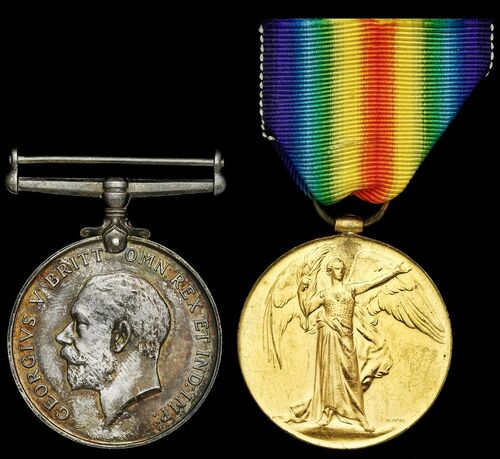
Auction: 23112 - Orders, Decorations and Medals - e-Auction
Lot: 555
A poignant 'Mesopotamia 1916' casualty's pair awarded to Private A. Blackley, Seaforth Highlanders who was mortally wounded in the attempt to relieve Kut in January 1916
British War and Victory Medals (S-2625 Pte. A. Blackley. Sea. Highrs.), nearly extremely fine (2)
Andrew Blackley was born at Elderslie, Paisley in 1896, the son of John and Jane Blackley, of 1, Wallace Place, Elderslie, Renfrewshire. Enlisting at Johnstone, Renfrewshire with the Seaforth Highlanders Blackley entered the war in France on 19 March 1915. He joined the 1st Battalion who had arrived from India in October the year previously, as part of the Meerut Division.
France
Blackley's first taste of real action on the Western Front was the Battle of Aubers Ridge on 9 May 1915, when the Battalion was thrown into the fighting along with the rest of the Division in support of a larger French attack to the south. A heavy bombardment preceded the attack however it soon became clear that they had failed to seriously damage the enemy positions. Leaving the trenches, they were met with a wall of maxim and rifle fire- three attempts were made each with heavy losses and the attack ended with no ground taken and a casualty rate of 21 officers, 488 men.
The Battalion later saw action at the Battle of Loos before being posted to join the British army in Mesopotamia. Arriving in December they joined General Alymer's Tigris Corps, marching to the relief of Kut which was besieged early in the month.
The Siege of Kut
Blackley and the rest of the 1st Battalion were immediately thrown into the relief efforts, serving as part of the 19th Brigade they went into action at the Battle of Sheikh Sa'ad. Under pressure from Townsend- bottled up in Kut- Alymer sent General Younghusband with those forces available to attempt a breakthrough. Without cavalry and with the weather too poor to launch aircraft the British marched blindly into the Ottoman defences around Sheikh Sa'ad, 6 January.
The first day of fighting resulted in a failure to breakthrough against stiff resistance from the outnumbered Ottoman defenders. 19th Brigade formed part of the British left for the second day of fighting requiring a five-mile march in the searing desert heat before they reached their starting positions.
The delay allowed the Ottoman's to launch a spoiling attack which- while driven back- caused further delays, seriously disordering the assault. Repeated attacks against the Ottoman 35th Division failed to make a breakthrough, the poor cover before the defences forced the Brigade to advance through a storm of machine gun, rifle and shell fire with no respite.
Regrouping on 8 January, Tigris Corps was to make two more attempts to reach the defenders at Wadi on 13 January and Hanna on 21 January. At some stage during the month Blackley was seriously wounded in the fighting- likely at Hanna when the British forces took some 2,700 losses in a single day.
The standard of medical care available to the Tigris Corps was extremely low and it is likely Blackely was evacuated to Basra or even to one of the Hospital Ships operating in the Persian Gulf. Sadly, his wounds were to prove mortal and he died from them on 30 January 1916 with his place of death listed as the 'Persian Gulf'. He is buried at the Basra War Cemetery and remembered on the Scottish National Memorial Roll; sold together with copied medal roll, Soldier Died in the Great War entry and Commonwealth War Graves Certificate.
Further entitled to the 1914-15 Star.
Subject to 20% VAT on Buyer’s Premium. For more information please view Terms and Conditions for Buyers.
Estimate
£100 to £140
Starting price
£70




